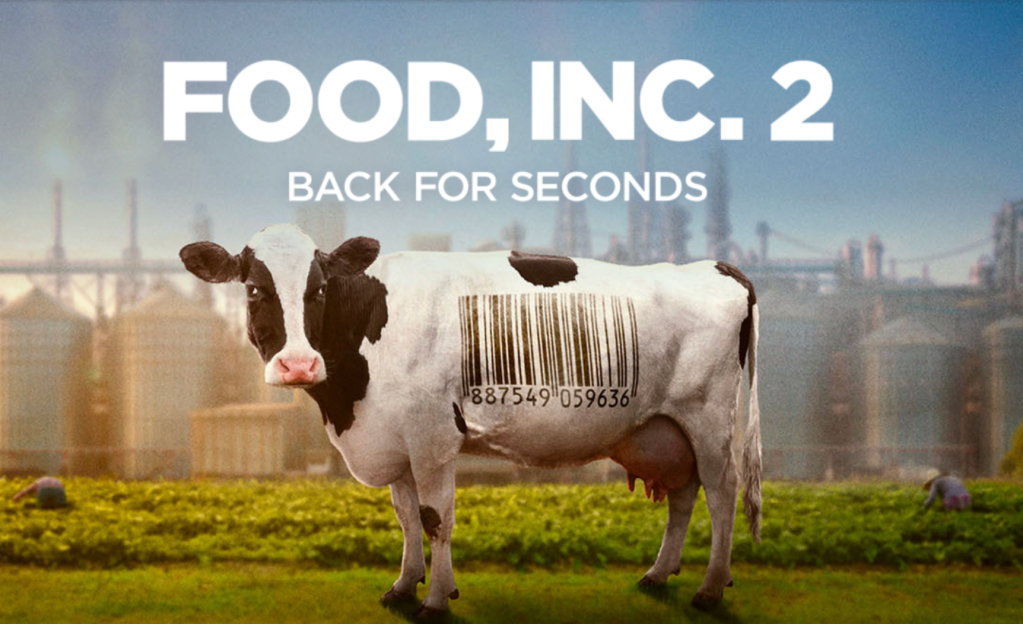
Hollywood loves sequels, but in the nonfiction space it’s rare for a documentary to get a follow up. However, 15 years after Food, Inc. landed with huge impact, the sequel Food, Inc. 2 premiered at the Telluride Film Festival, bringing a fresh perspective on America’s spoiled food system.
“All of us swore we would never go to this area again,” said Robert Kenner, director of the original Food, Inc. He co-directed Participant’s Food, Inc. 2 with Melissa Robledo, a co-producer on the first film. “But I think on some levels this became such an important story to go tell that we all felt we needed to come back and we could talk about it in sort of stronger terms than we did [before].”
The catalyst for the sequel became the pandemic, which exposed the vulnerabilities of a food system dominated by a handful of massive agribusiness companies including Cargill, ADM, and Tyson Foods.
Author and ‘Food, Inc. 2’ producer Michael Pollan at the Telluride Film Festival.
Paul Best/Getty Images for ABA
“When you get a system that is so hyper-efficient, it also becomes very brittle and it can’t withstand shocks,” author Michael Pollan, a producer on Food, Inc. 2 and a special consultant on the orginal, told Deadline in Telluride. “We were seeing farmers throwing out tremendous amounts of food, euthanizing pigs, spilling milk on the ground at the same time supermarket shelves were empty. And how could those two things go together?”
The lumbering giants of ag business were too clumsy to adjust, the filmmakers say. What those companies did have going for them was immense power in Washington. That became evident after meat packing plants turned into Covid super spreaders. When local authorities in Waterloo, Iowa tried to pause production at a Tyson Foods plant in response to a Covid outbreak, company chairman John Tyson had other ideas. He wrote a letter to then President Trump urging him to keep production lines open despite the risk to workers. Two days later, Trump obliged with an executive order (drafted with help from Tyson), citing his authority under the Defense Production Act.
“A complete abuse of that Act, by the way,” Pollan maintained. “If you ever needed a better illustration of corporate power run amok, it was that John Tyson-to-Trump letter.”

Label for an ultra-processed meat product.
Photo illustration by Dan Kitwood/Getty Images
One of the new areas of exploration in the sequel is the growth of ultra-processed foods, which now account for about 58 percent of daily calorie intake among Americans. The film looks at studies which show ultra-processed foods (breakfast cereals, carbonated drinks, frozen pizzas, candy, etc.) trick the brain into eating more. That, in turn, leads to higher rates of obesity and diabetes.
Food companies pour millions of dollars into research to artificially boost the flavor profile and appearance of products, resulting in Americans “losing their taste for real food,” as Pollan says in the film. Big ag companies receive billions of dollars in subsidies to grow commodity crops like corn. Not surprisingly, corn and corn-derived sweeteners wind up in more foods, again with deleterious health effects.
“Diets rich in [high fructose corn syrup],” according to an article published on Healthline.com, “have been linked to health concerns like fatty liver, high triglycerides, insulin resistance, high blood sugar, and an increased risk of type 2 diabetes.”
“This is the ultimate capitalist move,” Kenner observed. “It might kill its customers, but it’s taking advantage of cheap commodity prices.”

Tomato harvesters in ‘Food, Inc. 2’
Participant
Food, Inc. 2, however, isn’t all doom and gloom. Far from it, in fact. The Fair Food movement has been growing in Florida, for instance, which has seen tomato pickers persuade some producers to give them better wages and working conditions. The movement has enjoyed some success enlisting consumers to press companies to market products that don’t involve exploitation of labor.
“The Achilles heel of capitalism, consumer capitalism anyway, is the brand. Companies are more afraid of their brand being sullied than they are of any regulation,” Pollan said. The [Fair Food] coalition figured that out – if we attack these brands, if we try to draw attention to the chairman of Burger King publicly, shame people, all this kind of thing, it was effective.”
Wendy’s came in for some public shaming after it “stopped buying winter tomatoes from Florida, instead choosing to purchase from Mexico, where forced labor and abusive farm conditions are more common,” according to a report by FastCompany. Wendy’s reportedly said its move was “unrelated to the Fair Food Program.”

Farmer Zack Smith with some of his pigs in the Cluster Cluck 5000.
Participant
Commodity crops like corn and soybeans have been depleting precious topsoil in states like Iowa. But the film shows how farmer and entrepreneur Zack Smith has created an innovative solution to that problem. He co-designed an ingenious “mobile barn” he calls a Cluster Cluck 5000 that moves through fields. In front are goats and sheep that happily munch on crops. In back of a central unit, pigs root about in dirt, aerating the soil and depositing manure. Every few hours, the mobile barn relocates to a new spot and the animals renew their efforts.
“They’re always happy,” Smith told Deadline about the animals. “They never look stressed. There’s always fresh pasture coming and they’re excited. Every time the barn moves, you can literally see the excitement in the animals. It’s incredible. It’s delightful.”
The Cluster Cluck keeps soil in place and improves crops. Smith said scaling his project is “not a hard thing… I know how to make this work on the production side and we’ve proven that.”

‘Food, Inc. 2’ director Robert Kenner and producer Eric Schlosser in Telluride.
Paul Best/Getty Images for ABA
The processing side – where pigs and other animals go to slaughter – is another matter. That’s controlled by the big ag companies.
“There’s the brightness of people like Zack out there doing great things. We just need to be able to create a system where people like Zack can flourish,” Kenner said. “And it’s not a fair, even playing field at the moment.”

Director Melissa Robledo in Telluride.
Paul Best/Getty Images for ABA
If you’ll forgive the metaphor, there’s a strong appetite for the stories told and topics covered in Food, Inc. 2.
“The interest is definitely still there among consumers,” Robledo, the co-director, said. “I think there’s no shortage of interest in these issues and what’s going on. People have been continuously interested from the time the first film came out.”
Food, dare we say, for thought.














